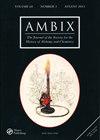White Blood: A History of Human Milk
IF 0.3
3区 哲学
Q3 HISTORY & PHILOSOPHY OF SCIENCE
引用次数: 2
Abstract
(e.g. pp. 216, 335). However, Lennartson wonderfully translates a couple of reactions that Bergman represented symbolically into modern nomenclature, illustrating, aside from the symbols themselves, how nothing has changed (p. 275). While it is fashionable to be critical of modern publishing, I cannot refrain from comment about the poor, possibly non-existent, copy-editing, which is, of course, not the author’s fault. While the author is clearly very fluent in English, almost every page contains an error of some sort – e.g. “dived” for “divided,” “where” for “were” –while the phrase “Swedish biographers only priced her [Bergman’s wife] for taking good care of her husband” is opaque, though I suppose “prized” or possibly “valued” rather than “priced”might have been intended (pp. 14, 58, 191). Cumulatively, these become very distracting, and the publisher should have employed a native English speaker to read through the text to remove them. On the positive side, the publisher did allow a large number of illustrations, all in colour, including portraits, maps (very useful, though a scale would have been helpful), buildings (including floor plans), apparatus, crystals, manuscripts, book pages, etc. Generally they are clear, though the images of Bergman’s blow-pipe box (p. 326) and of the basalt formations at Billingen (p. 85) are both a bit murky. Also, there is no list of illustrations, which would have been helpful. This seems to be one of the first books to be published in a new series entitled Perspectives on the History of Chemistry, edited by Seth Rasmussen, which “aims to provide volumes that advance the historical knowledge of chemistry and its practice, while also remaining accessible to both scientists and formal historians of science. Volumes should thus be of broad interest to the greater chemical community, while still retaining a high level of historical scholarship” (front matter, n.p.). Though I am not quite sure what “formal” means here, this Plutarchian biography generally meets these criteria and one cannot really ask for more.《白血:人类乳汁的历史
(例如,第216335页)。然而,Lennartson出色地将伯格曼象征性地代表的几个反应翻译成了现代命名法,说明了除了符号本身之外,什么都没有改变(第275页)。虽然批评现代出版是一种时尚,但我不能不评论糟糕的、可能根本不存在的文案编辑,这当然不是作者的错。虽然作者的英语显然非常流利,但几乎每一页都包含某种错误——例如“divided”代表“divides”,“where”代表“was”——而“瑞典传记作家只认为她(伯格曼的妻子)照顾丈夫很好”这句话是不透明的,尽管我认为“有价值”或可能是“有价值的”而不是“定价的”可能是有意的(第14、58191页)。随着时间的推移,这些内容变得非常分散注意力,出版商本应该雇佣一位以英语为母语的人通读文本来删除它们。从积极的方面来看,出版商确实允许了大量的插图,都是彩色的,包括肖像、地图(非常有用,尽管比例尺会很有帮助)、建筑(包括平面图)、仪器、水晶、手稿、书页等,尽管伯格曼的吹管箱(第326页)和比林根玄武岩地层(第85页)的图像都有点模糊。此外,没有插图列表,这会很有帮助。这似乎是由Seth Rasmussen编辑的题为“透视化学史”的新系列中出版的首批书籍之一,该书“旨在提供促进化学及其实践历史知识的书籍,同时让科学家和正式的科学历史学家都能接触到。因此,这些书籍应该引起更大的化学界的广泛兴趣,同时仍然保持高水平的历史学术”(front matter,n.p.)。虽然我不太确定“正式”在这里意味着什么,但这本普鲁塔克传记通常符合这些标准,人们真的不能要求更多。
本文章由计算机程序翻译,如有差异,请以英文原文为准。
求助全文
约1分钟内获得全文
求助全文
来源期刊

Ambix
HISTORY & PHILOSOPHY OF SCIENCE-
CiteScore
0.80
自引率
60.00%
发文量
42
审稿时长
3 months
期刊介绍:
Ambix is an internationally recognised, peer-reviewed quarterly journal devoted to publishing high-quality, original research and book reviews in the intellectual, social and cultural history of alchemy and chemistry. It publishes studies, discussions, and primary sources relevant to the historical experience of all areas related to alchemy and chemistry covering all periods (ancient to modern) and geographical regions. Ambix publishes individual papers, focused thematic sections and larger special issues (either single or double and usually guest-edited). Topics covered by Ambix include, but are not limited to, interactions between alchemy and chemistry and other disciplines; chemical medicine and pharmacy; molecular sciences; practices allied to material, instrumental, institutional and visual cultures; environmental chemistry; the chemical industry; the appearance of alchemy and chemistry within popular culture; biographical and historiographical studies; and the study of issues related to gender, race, and colonial experience within the context of chemistry.
 求助内容:
求助内容: 应助结果提醒方式:
应助结果提醒方式:


